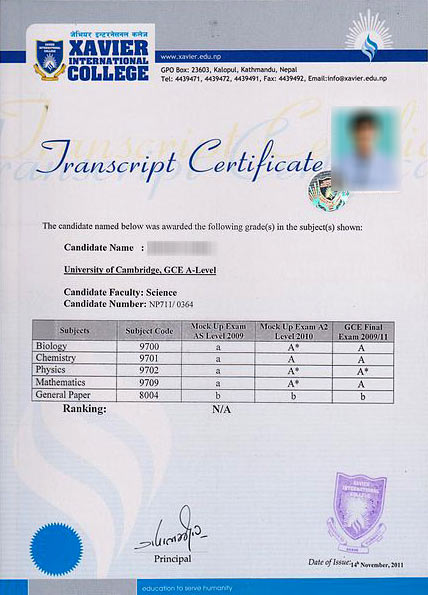Photographs: Reuters Varun Aggarwal
If you are applying to a university abroad, watch out for these blunders before you hit submit!
Eighteen-year-old Akhil Awasthi from Jabalpur applied to the School of Forensic Sciences at the erstwhile University of Glamorgan (now University of South Wales).
The university rejected the application almost immediately.
The reason was straight forward, as far as the university was concerned.
It was a reason, which seemed harmless enough; missing an important step laid down by the application procedure of the university.
Though his predicament might seem harsh, the fact remains that an alarmingly high number of students have made and are susceptible to making such mistakes.
One of the main reasons applications were rejected in 2012, was the lack of adequate documentation along with the application.
However, other factors like confusion caused by bank solvency letters and transcripts have added to the woes of unsuccessful students.
We present you a list of the most common blunders students make while submitting their applications.
1. Incomplete Application Form
More than 2/3rd of the Indian student contingent has faced rejection from universities and respective embassies in the recent years.
The reason is simple -- an incomplete application form.
Students should not submit their application forms even if they have completed nine out of the ten steps required by the procedure dictated in the application form.
Reading the 'extra' fine print on the application form can be the difference maker, even if it means getting out the magnifying glass.
The author Varun Aggarwal is COO and co-founder, Univariety, an organisation that counsels and mentors students pick the right international course and university abroad.
Please click NEXT to continue reading...
Applying to a foreign university? Seven things you must know!
Image: For representational purposes onlyPhotographs: Bineetojha/Wikimedia Commons
2. Transcription sheet
It would have probably been an ideal world for a student if transcriptions were equal to mark sheets.
However, this is not the case, a transcription refers to a detailed semester-wise statement of marks of a student printed on the letterhead of the university.
This is what universities abroad call a 'transcript'.
It is in essence a new document, while most mark sheets issued by schools and universities in India only highlight the student's overall yearly grades/marks.
Applying to a foreign university? Seven things you must know!
3. Application Fee
Another most common blunder that students make is they fail to pay the mandatory application fee to universities.
The application fee is not to be mistaken with the admission fee.
Every year, universities reject hundreds of international applications because students do not submit the application fee along with the online application form.
The important lesson to learn here is to pay the application fee before the admission fee, which means, you pay the fee even before your application is considered.
Illustration by Dominic Xavier
Applying to a foreign university? Seven things you must know!
Image: For representational purposes onlyPhotographs: Jayanta Dey/Reuters
4. Solvency letters
Many Indian students mistake solvency letters, which universities ask for, for bank statements.
A solvency letter is a letter issued by the bank stating the amount and details of liquid funds in the student's name.
The letter validates the sufficiency of these funds.
There is a common misconception that there is no need to submit a bank statement if the student is a scholarship beneficiary.
In case you weren't aware of this before, it is important to submit both the statements even by students who travel abroad on a 100 percent scholarship.
The solvency letter serves as a collateral proof that the student would be able to bear the cost of living and other associated expenditure while studying.
Applying to a foreign university? Seven things you must know!
5. Education loan limitations
Most Indian students rely on some education loan to fund their studies.
Usually, the loan only covers 2/3rd of the total cost of education, and students usually overlook other expenditure like rental and sustenance costs.
One of the misconceptions here is that the loan will cover all the student’s expenses, which is far from the usual case.
Ensure that you have enough funds to take care of your accommodation and living costs.
Illustration by Uttam Ghosh
Applying to a foreign university? Seven things you must know!
Image: Old Campus at Yale University in New Haven, Connecticut; For representational purposes onlyPhotographs: Michelle McLoughlin/Reuters
6. University specialities
We have all grown up listening to illustrious names like Oxford, Cambridge, Yale or the London School of Economics.
However, the idea that a college is good for engineering, thus, it must be good for other disciplines like art or humanities is laughable.
It is common knowledge that different departments will have teachers with different skill sets and it might very well happen that the department or speciality a student picks is not exactly the university's forte.
Either way this happens to be one of the most common errors students and their parents make while applying to universities abroad.
Applying to a foreign university? Seven things you must know!
Image: For representational purposes onlyPhotographs: Reuters
7. Personal Statements or Common Essays
Most universities abroad ask for personal statements or common essays as part of the application process.
Admission counsellors are particularly strict and expect students to follow the instructions for these essays.
Getting confused about the word length of the written statement is one of the errors students are most prone to make.
A very common false impression that students get is that a longer essay would help them score better in the tests. It is one of the most treacherous rumours.
Ignoring the guidelines provided with a task or overusing prepositions and conjunctions and reproducing someone else’s work can have serious repercussions.
Admission counsellors instantaneously reject students for such reasons.
The best way to avoid mistakes is to learn from them.
Though some mistakes can be compunctious, exercising a little bit of caution can go a long way towards curbing mistakes like the ones mentioned here.








Comment
article